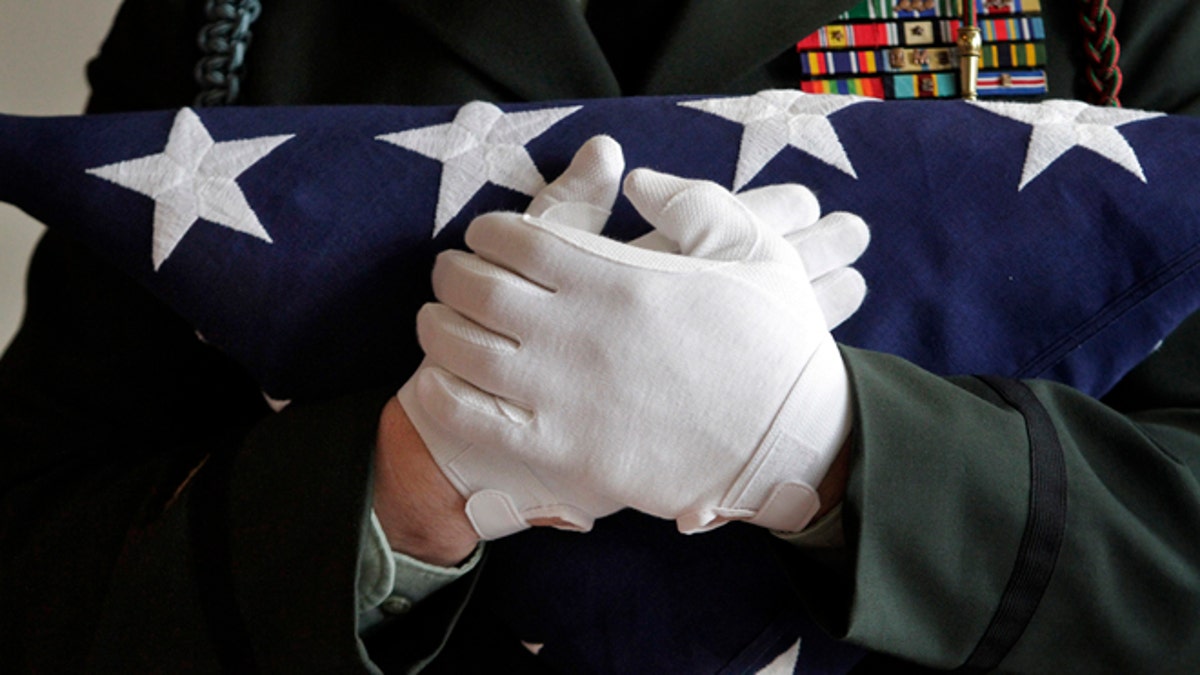
A National Guard captain holds a folded American flag. (AP)
In the history of our nation we have never been at war for so long. Only now we are beginning to see the effects a long-term war has on our servicemembers.
One tragic by-product seems to be the increase in suicides by the men and women who serve in our nation's military. Presently, the average is one suicide per day so far in 2012. That shocking number is the highest it has been in a decade. According to statistics released by the Army, in July alone there were 26 possible suicides with one confirmed and the others 25 are still being investigated.
After learning about these statistics many Americans would immediately assume that there must be a direct link between exposure to combat and the risk of suicide. However, they would be mistaken.
To see suicide as strictly a war-related issue is not accurate. While repeated exposure to combat, Traumatic Brain Injuries and PTSD/PTS may be related to suicides; over half of the military suicides were by members who had not been deployed.
Many of the issues related to suicide are financial or may stem from relationship difficulties and substance dependency. An alarming number of the documented suicides were also committed by National Guard members and reservists who traditionally do not have easy access to military support, mental health counseling or even the camaraderie that comes from serving on active duty and being assigned to an installation.
Whatever the cause may be, the Department of Defense has begun to aggressively address the problem of military suicides. Defense Secretary Leon Panetta recently unveiled his plan to combat the rising number of suicides. In his plan he focused on 4 key “pillars”:
1. Leadership
2. Improving access to and quality of health care.
3. Elevating mental fitness to the same level as physical fitness is in the military/DoD culture
4. Increasing research into suicide prevention
Although Secretary Panetta’s suicide prevention plan is honorable and admirable there are still underlying issues that need to be addressed to best serve members of the military.
For example, servicemembers, particularly active duty servicemembers, may still be unwilling to seek out mental health services. They may fear being labeled as weak, mentally unstable or possibly deemed unable to serve again in active combat.
Unfortunately, there is no quick solution to allay these fears. It is impossible to undo an ideology that is so prevalent among military personnel. Sadly, it will likely take years before most soldiers will feel comfortable enough to access the mental health services offered on base.
The real dilemma our military is facing is how to reverse the epidemic of suicides within its ranks. The only solution is to work to prevent them from happening in the first place.
To save others from making that devastating choice family members and servicemembers alike must learn about suicide risk factors. They must understand the signs that point to a person who is struggling with suicidal thoughts. Finally, everyone involved must learn about the all-important warning signs. The Department of Defense lists suicide warning signs as follows:
- Talking or writing about death and ways to die
- Showing sudden changes in mood or behavior
- Sleeping or eating changes
- Exhibiting reckless or risky behaviors
- Exhibiting hopelessness about the future
- Preparing a will
- Giving things away
- Making arrangements for pets
- Unusual spending patterns
- Withdrawing from others
Should you be concerned about a loved one or are experiencing some of these warning signs yourself, I urge you to please seek professional help immediately via National Suicide Prevention Lifeline at 800-273-TALK (8255) or visit www.suicidepreventionlifeline.org.
With Secretary Panetta’s heavy focus on this issue and more awareness within the military community, let us hope that we’ll begin to see a decline in military suicides. To lose even one of our nation’s servicemembers to suicide is sobering and tragic and we must all do everything we can to reach out and help those in our military who are suffering.
